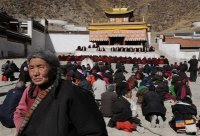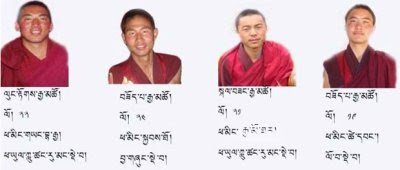Agam's Gecko


Friday, May 01, 2009
TIBETAN STUDENTS STAND UP; CHINESE POLICE GET DIRTY; UNLIKELY HEROES FOUND
| H |
undreds of Tibetan students protested Chinese school policies in Amdo Labrang last Friday morning, according to many sources. The students of the Sangchu (Ch: Xiahe) Tibetan Middle School gathered early on April 24 at their school, located near the Labrang Monastery in Sangchu County, Kanlho Tibetan "Autonomous" Prefecture (Ch: Gansu province). The young demonstrators then marched from the school and headed toward the main market of Labrang town, until they were stopped and forced back to the school by Public Security Bureau forces and People's Armed Police. Local sources say that the security forces immediately surrounded the school, preventing anyone from entering or leaving.
The students' grievances are said to have been against the authorities' reported practice of diverting higher education placements which are supposedly reserved for Tibetan students, to Chinese students. The Voice of Tibet radio service reports the students' disappointment over the rising number of Chinese students taking placements at college level institutes which are supposed to benefit Tibetans. No arrests of students were reported and it remains difficult to contact the area, which has been under tight security for many months. A separate source told Phayul News that over one thousand students study at the school.
Additional accounts received by the exile Tibetan government say that the students carried banners reading "Peace and Freedom", and began the protest during their morning exercise period around 7 a.m. An additional complaint was also cited, saying the students were expressing resistance to the required study of articles by one "Yidor", which were denunciations of His Holiness the Dalai Lama. Heavier restrictions were placed on the surrounding areas following the protest. AFP confirmed the incident with a local hotel proprietor, who said there had been no violence. Phone calls placed to the local public security bureau, and to the school itself, went unanswered.
Which brings us around again to the case of Phurbu Tsering Rinpoche.
Phurbu Rinpoche (also called Bu Rong Na Rinpoche — Rinpoche meaning an "incarnate lama" but translated by the Chinese as "Living Buddha") was arrested at his home in Drango County, Kardze on May 18 last year. As the spiritual preceptor for two convents in the Drango area, as well as the founder of a home for the aged and medical services clinics in his community, Phurbu Rinpoche is deeply loved and respected by Tibetans. The charges against him were only recently revealed at his trial in Dartsedo (Ch: Kangding) — illegal possession of weapons and government land.
 Phurbu Tsering Rinpoche in an undated photo. Photo: Bu Rong Na Temple |
Legal experts said that such a move was rare for a Chinese court and could indicate that the unusually spirited defence presented in court and the international publicity the case has attracted could have prompted unexpected debate among judicial officials over the sentence.Rinpoche had selected his defence lawyers well, and his ability to speak Chinese undoubtedly also helped him. One of his legal defenders, Jian Tianyong, was already on his way to the airport when his partner, Li Fangping, received the postponement call from a deputy judge in Dartsedo. Both men are prominent civil rights attorneys, and Mr. Jian was one of a group of lawyers who had volunteered to defend the Tibetans charged after the protests began last year. Chinese authorities then warned the lawyers' group to stay out of it, threatening them with loss of their rights to practice law (some of those threats were carried out). Lawyers are frequently derided in western countries, but these two Beijing-based defenders can well be considered heroes.
The Tibetan author, poet, and citizen journalist Woeser had a translated account of Phurbu Tsering's arrest and trial published in the Asian Wall Street Journal this week. I link to Phayul for this one mainly for the wonderful photograph, which I've cropped here. Take a good look at the full size version over there.
Imagine the scene in a small Tibetan mountain town in the center of the Kham region last May 18. All forms of communication with the town are cut off before dawn, and all roads are blocked. As more than 4,000 PLA troops, PAP forces and special units divide up to surround and control two nearby convents, over 1,000 security forces take up positions and prepare their assault on one small house. Their target is that dangerous looking fellow grinning under the big sky.
It's very clear that Phurbu Tsering was being framed, and they may still pull it off. He was forced to sign a confession after four days of real torture and threats against his family, and he recanted that confession in court. The firearms and bullets "found" in his living room (a virtual public place, with visitors coming and going constantly due to his high status in the community) were never investigated as to their origin, and were not even checked for fingerprints. On the illegal land use charge (involving his home for the elderly), documents reviewed in court actually proved that the land use permits were all above-board. Read Woeser's piece for an excellent account of all this (and by the way, she had a very fine profile published in the NY Times last weekend). For a more in-depth look into the trial proceedings, including translated court documents, ICT is the place to go.
Phurbu Tsering Rinpoche's Chinese devotees have maintained a website to support his work, with information on the charities he established, the Rest House for Elders, the new travellers' hostel for visitors to Bu Rong Na Temple, his adoption of orphans (including ethnic Chinese children) and more. Background and history of the Bu Rong Na Temple is here.
International attention to specific cases can have a positive effect on the treatment of political prisoners, as in the case of the recently released monk / filmmaker Golog Jigme Gyatso, who first became aware of the international pressure on his Chinese interrogators by the relatively better treatment he received as compared with other prisoners. Perhaps Phurbu Rinpoche may have a chance for justice.
International pressure has been insufficient to produce any movement at all on the part of the PRC however, in the case of the abducted 11th Panchen Lama. Chinese authorities disappeared the young incarnate lama at the age of six (along with his family), and there has been no evidence of his existence during the past fourteen years despite enquiries from many governments and international organisations. Chinese authorities insist that Gedhun Choekyi Nyima merely wants his privacy, and refuse to provide so much as a photograph. The Panchen Lama turned 20 years old on April 25. The former abbot of Panchen Lama's Tashi Lhunpo Monastery in Shigatse, Chadrel Rinpoche, was also the chairman of the government-approved search committee in 1995. He was tried and sentenced for "splittism" and "leaking state secrets", and his sentence ended in 2001. There has also been no credible evidence of his existence or wellbeing since that time.
In an open letter to President Hu Jintao dated April 27, the Speaker of the democratically-elected Tibetan Parliament in Exile, Penpa Tsering, expressed deep concern for the well-being of the Panchen Lama — revealing something which I have not seen reported elsewhere.
"According to media reports, a Japanese journalist Yoichi Shimatsu had at a conference at Qinghua University in Beijing stated that His Eminence Panchen Rinpoche Gedhun Choekyi Nyima had died of cancer some years ago, which is in total contradiction to your government’s stated position that all is well with H.E. Panchen Rinpoche."It's time for China to come clean once and for all on the fate of a young man who, for most of his life, has been the world's youngest political prisoner.
If one has a cause that one wishes to express in the most peaceful, non-threatening manner possible, what do you do? One method used in countless countries around the world is the old, tried and true, candle-light vigil. For example, there have been innumerable such vigils on behalf of the aforementioned Panchen Lama over the years (in cities and towns on every continent but Antarctica). But if there's one thing China's communist authority simply will not tolerate, apparently, it's the candle-light vigil. Monks of Lutsang Monastery in Mangra County, Amdo (Ch: Qinghai) held a peaceful candle procession and vigil on February 25 this year, the first day of Losar, the Tibetan new year. The candle-bearing monks were later arrested (109 of them) and subjected to "severe patriotism re-education" for nearly a month, when all but six were released. The remaining six were said to be released from custody around April 10.
The Chinese colonial authorities are experts in preventing information from escaping Tibet, through selective cell network closure, internet gateway controls, restrictions on travel, and of course prosecutions of those who attempt to communicate with Tibetans outside the country. But they're also quite keen on preventing information from entering Tibet, as evidenced this month in a crackdown on satellite receivers.
Radio Free Asia's Mandarin language service reports that since March of this year, some Tibetans in Qinghai, Sichuan, Yunnan and Gansu provinces, and in the T-"A"-R have been installing their own satellite receivers. Chinese authorities claim that this is a plot by "secret agents from the Tibet independence movement" and have been seizing the offending equipment and installing "official" receivers in their place. In Machu County alone, 170 sets of equipment were replaced between April 10 - 23, depriving the people of viewing news from India and other neighbouring countries, overseas broadcasts including Tibetan language programming from VOA and RFA, as well as internet access. The new receivers are only able to tune in China Central Television signals.
On the day he was to receive the honour of one of the world's most prestigious literary awards, Chinese writer Liu Xiaobo had one of his essays published in the London Times in which he declares the internet as God's gift to China. "It is the best tool for the Chinese people in their project to cast off slavery and strive for freedom," he wrote. Mr. Liu received the 2009 PEN / Barbara Goldsmith Freedom to Write Award on Tuesday — in absentia. He presently resides in a windowless cell at an undisclosed location in China. He has been in detention since December 8, the day his Charter 08 appeal for democratic reforms, signed by over 300 Chinese intellectuals, was published.
Didn't the Olympics hold some sort of promise of progress toward human rights in China? Oh yes, right — never ever trust the CCP's promises. Another signatory to Charter 08, law professor He Weifang, has been sent into internal exile in Xinjiang. Professor He tells the Daily Telegraph that freedom of speech in China is now worse than it was before the Olympics.
.











 Our way of saying "thanks" in the Thai way. Here a nak muay Thai (kickboxer) offers respect and thanks for his teacher (wai khru) before a match. This is our local variation on the ubiquitous "hat tip" used in general blog culture.
Our way of saying "thanks" in the Thai way. Here a nak muay Thai (kickboxer) offers respect and thanks for his teacher (wai khru) before a match. This is our local variation on the ubiquitous "hat tip" used in general blog culture.










